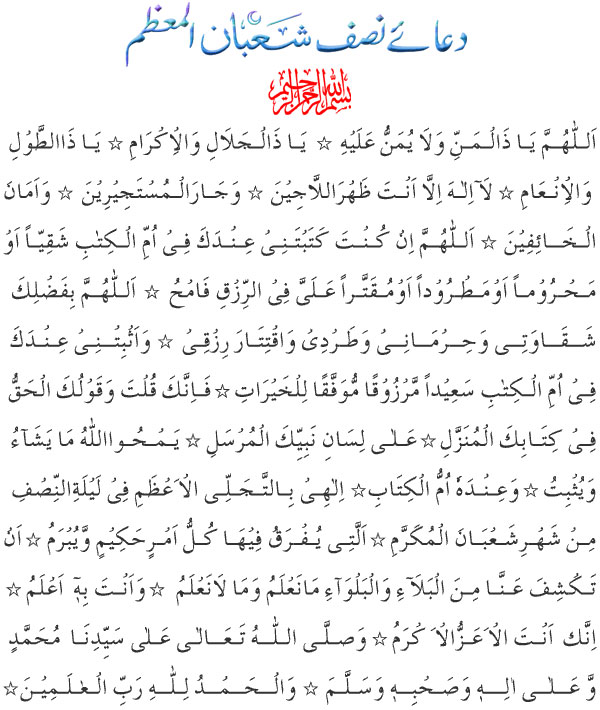I. Hadrat Anas reported that when the Holy Prophet came to Madinah, the people had two days in which they used to entertain and amuse themselves. He asked: “What are these two days?” They said: “We used to amuse ourselves and take pleasure in these two days during the Days of Ignorance (jahiliyyah). The Messenger of Allah said, “Allah has substituted for you something better than these two; the Eid of Adha (sacrifice) and the Eid of Fitr . [Sunan Abi Dawood – Book on Prayer, Vol 1, Page 162]
II. Hadrat Abu al-Huwairith reported that the Messenger of Allah wrote to Hadrat ‘Amr ibn Hazm, when he was in Najran, asking him to observe the prayer early on the Eid of Adha (sacrifice) and late on the Eid of Fitr, and to admonish the people. [Mishkaat – Book on Prayer, Vol 1, Page 127]
III. Hadrat Jabir ibn Samurah reported, “I prayed with the Messenger of Allah the two Eid prayers more than once or twice, without an Adhan or Iqamah.” [Sahih Muslim – Book on the two Eid Prayers, Vol 1, Page 290]
IV. Hadrat Anas reported that the Messenger of Allah did not go (to the place of prayer) in the morning on the day of Eid-ul-Fitr till he ate some dates, and he used to eat an odd number. [Sahih Bukhari – Book on the two Eid Prayers, Vol 1, Page 130]
V. Hadrat Buraidah reported that the Holy Prophet did not go out on the day of Eid-ul-Fitr till he had eaten some food; and that he did not eat any food on the day of Eid-ul-Adha (sacrifice) till he had prayed. [Sunan Tirmidhi – Book on the two Eid Prayers, Vol 1, Page 120]
VI. Hadrat Jabir reported that on the day of Eid the Holy Prophet used to return by a different route from the one he had taken when going out. [Sahih Bukhari – Book on the two Eid Prayers, Vol 1, Page 134]
Important Notes:
1. To greet, embrace and shake hands with one another, after the Eidain prayer is an act of reward; and which is also a means of increasing love and affection between Muslims and a way of expressing ones joy and happiness.
2. It is not permissible for females to perform the Eidain prayers, as there shall be mixing between the men and the women in the Eidgah (place where the Eid prayer is performed). This is why it is not permissible for females to go to the Masajid to perform salaah with congregation; whether they go in day or at night; whether for Jum’ah or for Eidain; whether they are old or young. [This has been stated in Tanwir al-Absar and al-Durr al-Mukhtar Page 114]
Yes, however, before Zawal women can perform the 2 or 4 rak’ats Chasht (Salatud Duha) prayer at home, after the Eidain prayer has finished. [Bahar-e-Shari’at – Vol. 1, Chapter 4, Page 94]
3. If only the women have their own congregation for salaah, then this is also not permissible, as the congregation held by women between themselves (to perform salaah) is not allowed, in fact it is strictly disliked (Makruh-e-Tehrimi). [This has been stated in Fatawa-e-’Alamgiri Vol. 1 Page 80, also in al-Durr al-Mukhtar Page 77]
4. Even if women pray the Eidain prayer on their own, then this is also not permissible as it is a condition to establish the Eidain prayer that it is performed with a congregation. Yes! Women should pray the nafl (supererogatory) salaah on that day; at home, on their own. Insha’Allah they shall receive the blessings and rewards of that day.
Method for performing the Eid Prayer
The method is to make intention for Eid-ul-Fitr or Eid-ud-Duha for two Rakats Wajib and then lift your hands up to your ears and say ‘Allahu Akbar’ and then fold them below the navel as normal.
Now pray ‘Sana’ and then say Allahu Akbar and lift your hands up to your ears and release them and again lift your hands and say Allahu Akbar and release them again and then lift your hands again and say Allahu Akbar and then fold them.
This means fold your hands after the first and fourth Takbeer and in the second and third Takbeers release your hands. The best way to remember is that if the Imam shall recite after the Takbeer then fold your hands and when he shall not recite (after a Takbeer) release your hands and hang them on the side.
After folding your hands after the fourth Takbeer the Imam will silently recite ‘A’udhubillah’ and ‘Bismillah’ and then he will pray Surah al-Fatiha (‘Alhamd Sharif’) and a Surat loudly and then go into Ruku and Sijdah and (thus,) complete one Rak’at (unit).
Then in the second Rak’at the Imam will first pray the Alhamdu and a Surat then lift your hands to your ears and say Allahu Akbar and release them; and do not fold them and repeat this twice. Therefore a total of three times the Takbeer shall be said. On the fourth time say Allahu Akbar and without lifting your hands go into Ruku.
This therefore means that in the Eid prayer there are six extra Takbeers; three before Qira’at (recitation) and after Takbeer-e-Tahrima in the first Rak’at and three after Qira’at in the second Rakat and before the Takbeer for Ruku.
Also in all the extra Takbeers you must lift your hands and between two Takbeers a gap of three Tasbeehs should be made and it is Mustahab in the Eid prayer to recite after Alhamdu, ‘Surah al-Jumu’ah’ in the first Rak’at and ‘Surah al-Munafiqun’ in the second or in the first pray ‘Sabbih Isma Rabbik al-A’la’ and in the second ‘Hal Ataaka Hadeethul Ghasihiyah’. [al-Durr al-Mukhtar Pgs. 113-114, Bahar-e-Shari’at]
Method of performing the Eid prayer has been taken from the English version of the book “Qanoon-e-Shari’at”, by ‘Allama Shamsul ‘Ulama Shamsuddin Ahmed al-Radawi, the student of Sadr al-Shari’ah, Allama Mufti Amjad ‘Ali al-‘A’azmi.


